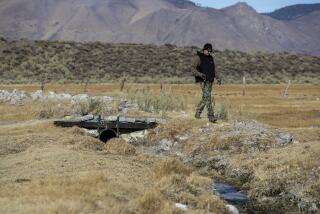Soviet Miners End Strike With Unprecedented Gains
- Share via
MOSCOW — Tens of thousands of Siberian coal miners ended a four-day strike Thursday after the Soviet coal minister signed an agreement giving them more control over the running of the mines and $80 million in pay increases, a correspondent for the official labor newspaper Trud said.
The concessions marked the first time in Soviet history that the government is known to have given in to strikers’ demands, and the prompt reporting of developments by official media under Soviet President Mikhail S. Gorbachev’s policy of openness was unprecedented.
A committee representing about 50,000 strikers at the country’s largest coal mine and nearby pits in the vital Kuzbass region of southwestern Siberia said that the miners will return to work today, Trud correspondent Vasili Klimov said.
“The miners have gone home to sleep,” Klimov said by telephone from Mezhdurechensk, site of the giant Raspadskaya mine and one of two coal sites that had been shut down by the worst labor uprising of Gorbachev’s era. Klimov said the strikers had not slept in two days.
Message to Moscow
“At 3 p.m., the committee declared the strike was over and sent a cable to the Supreme Soviet (Parliament) in Moscow,” said Klimov, who had reported the strike for Trud since its beginning Monday night.
Alexander Melnikov, head of the Mezhdurechensk Communist Party organization, told strikers who had demanded the resignations of local officials that they could choose city and party leaders from their own ranks, Klimov said.
“The strike has cost huge economic losses,” Melnikov later said in an interview on the evening television news program Vremya. “We have to get life back to normal.”
Major Concessions
Coal Industry Minister Mikhail I. Shchadov, who had flown to the region Tuesday, conferred with Moscow and then signed a government order granting major concessions including authorization for each coal mine to run its own financial affairs as an independent state enterprise as of Aug. 1, Klimov said.
Trud had reported Wednesday that the strikers wanted to strip the Coal Industry Ministry of its monopolistic control over the activities and finances of the country’s mines.
The order also committed the government to make good on wage promises that the Soviet Communist Party’s Central Committee made to all coal miners in February, 1987, but has not delivered, Klimov said.
He said the government concession will bring the Kuzbass strikers $80 million in wage increases through 1989, including a 20% boost for miners who work in the evenings and a 40% raise for night-shift workers.
Report From Tass
The official Tass news agency later reported that the strike had ended, with government concessions including “pay raises for miners working evening and night shifts, a single off-day at mines, better food supplies, expansion in housing construction and specific measures to improve environmental control.” It did not refer to increased economic independence as part of the settlement.
About 35,000 workers from five underground coal mines and four strip-mining sites in Mezhdurechensk, a city of 107,000 people, were joined in the strike by 15,000 colliers at several mines in nearby Osinniki, Klimov said.
Osinniki, a town of 60,000 people founded in 1938 as part of Josef Stalin’s industrialization drive, is 20 miles from Mezhdurechensk. Both cities are about 200 miles southeast of Novosibirsk, the biggest city in Siberia and the country’s sixth largest.
The Soviet Union is the world’s largest coal producer with an annual output of 760 million tons. It is believed to possess nearly 60% of the world’s reserves.
More to Read
Sign up for Essential California
The most important California stories and recommendations in your inbox every morning.
You may occasionally receive promotional content from the Los Angeles Times.













